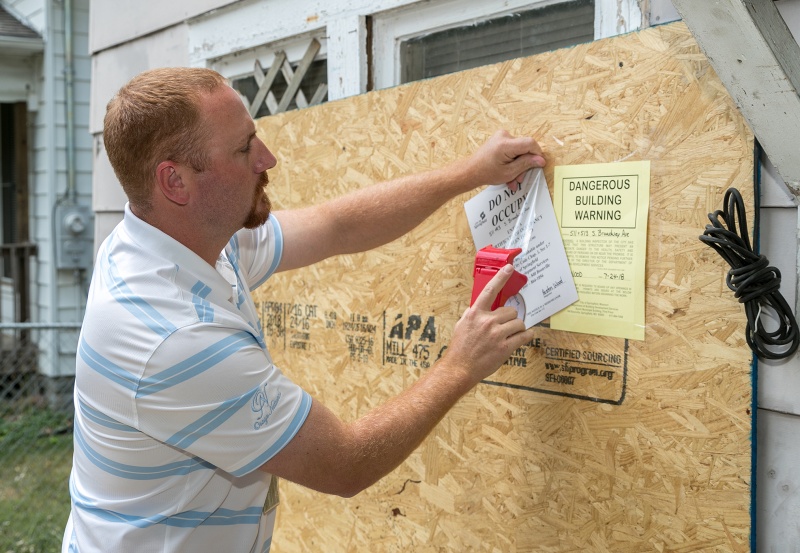
At its Feb. 24 meeting, Springfield City Council adopted the 2018 International Property Maintenance Code (IPMC) with a few local amendments.
The IPMC is a model code that regulates the maintenance requirements for existing buildings and houses.
The code is published every three years and provides a road map to the “keep it maintained” principle for a healthy home. The 2018 code requires increased levels for maintaining minimum property conditions for the purpose of ensuring public health, safety and welfare and allows City building inspectors to enforce modified minimum maintenance standards specifically for basic equipment, light, ventilation, heating, sanitation and fire safety. The changes will go into effect May 26.
The City previously enforced a modified version of the 2012 IPMC. The substantial difference between the 2012 and 2018 IPMC relates to fire safety, including more stringent requirements for fire-resistance ratings, fire protection systems, carbon monoxide alarms and detection. These requirements align with the currently adopted 2018 International Fire Code.
The updated language will be included in Article VII, “International Property Maintenance Code,” known as the “Land Development Code” located in Chapter 36 of the Springfield City Code. The code is online at https://library.municode.com/mo/springfield/codes/code_of_ordinances.
“Every small step the City takes to get a handle on nuisance properties adds up,” said Christina Dicken, who lives in the Doling neighborhood and has served as the neighborhood association’s president.

Council addressed the nuisance issue of tall grass and weeds in June 2019 by unanimously voting to reduce the violation height for grass and weeds from 12 inches to 7 inches and reduce the legal Notice to Abate timeframe for grass and overgrowth from 15 business days to 10 calendar days. Both changes were in accordance with state statute.
“Nuisance properties are an issue throughout the city. They bring down home value and increase the risk of crime. In West Central, we have a high number of rental properties that are not well maintained. We hope the new code will motivate the landlords to better maintain their properties, thus improving the overall quality of life in West Central,” said West Central Neighborhood Alliance President Caron Parnell.
Mayor Pro Tem Phyllis Ferguson, who represents Zone 1, said the adoption of the 2018 IPC is another step forward in the battle against nuisance properties and the devastating effects they individually and cumulatively have on Springfield neighborhoods.
“The message should be clear that the City of Springfield is serious about cleaning up neighborhoods,” she said.
Significant local amendments to the 2018 IPMC include:
- A provision prohibiting the discharge of solids, liquids and gases in a manner that would create a nuisance.
- Added language to the section addressing interior and exterior finishes, requiring proper and complete finish materials and prohibiting exposed insulation substrate or building wrap.
- Requiring the owner of occupied premises to provide a garbage container and remove rubbish and garbage at least every 14 days. 2012 local amendments limited requirement to properties of five units or more. 2018 language keeps IPMC language, which is no unit minimum.
- Addition of a definition of “vacant structure” to clarify when condition requirements for occupied structures are considered violations. The IPMC or any other ordinance does not render “vacant” secure and maintained structures as a violation, however, vacant structures and premises are required to be maintained safe, secure, and sanitary.
- Addition of a section addressing “Use of Cellar or Basement as Habitable Room.”
1) No cellar or basement space may be used as a habitable room and no basement space may be used as a dwelling unit unless:
• The floor and walls are impervious to leakage of underground and surface runoff water and are fully insulated against moisture intrusion and dampness;
• The total window area in each room is equal to at least the minimum window area size as required in Section 402;
• Such required minimum window area is located entirely above the grade of the ground adjoining such window area;
• The total, operable-window area in each room is equal to at least the minimum as required under Section 403, except where there is supplied some other device affording adequate ventilation, which is approved by the director of the Department of Building Development Services in writing.
2) Any basement or cellar space may be used for living, eating, cooking, or sleeping if, for each such use, there are other facilities complying with this article available within the same dwelling for the occupants thereof. The intent of this subsection is to allow any basement or cellar space to be used as a habitable room if it is supplemental to, or in addition to, a dwelling unit or habitable room complying with code.
- Redundant clauses enforceable in other City ordinances or those regulated and enforced by the state (such as elevator clauses) were stricken. Those include: definitions of inoperable motor vehicles, and regulation of elevator, escalators and dumbwaiters.


